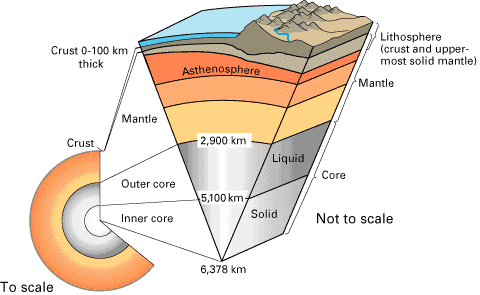[/caption]
Every rocky planet has a lithosphere, but what is lithosphere? It is the rigid outermost shell of a rocky planet. Here on Earth the lithosphere contains the crust and upper mantle. The Earth has two types of lithosphere: oceanic and continental. The lithosphere is broken up into tectonic plates.
Oceanic lithosphere consists mainly of mafic(rich in magnesium and iron) crust and ultramafic(over 90% mafic) mantle and is denser than continental lithosphere. It thickens as it ages and moves away from the mid-ocean ridge. This thickening occurs by conductive cooling, which converts hot asthenosphere into lithospheric mantle. It was less dense than the asthenosphere for tens of millions of years, but after this becomes increasingly denser. The gravitational instability of mature oceanic lithosphere has the effect that when tectonic plates come together, oceanic lithosphere invariably sinks underneath the overriding lithosphere. New oceanic lithosphere is constantly being produced at mid-ocean ridges and is recycled back to the mantle at subduction zones, so oceanic lithosphere is much younger than its continental counterpart. The oldest oceanic lithosphere is about 170 million years old compared to parts of the continental lithosphere which are billions of years old.
The continental lithosphere is also called the continental crust. It is the layer of igneous, sedimentary rock that forms the continents and the continental shelves. This layer consists mostly of granitic rock. Continental crust is also less dense than oceanic crust although it is considerably thicker(25 to 70 km versus 7-10 km). About 40% of the Earth’s surface is now covered by continental crust, but continental crust makes up about 70% of the volume of Earth’s crust. Most scientists believe that there was no continental crust originally on the Earth, but the continental crust ultimately derived from the fractional differentiation of oceanic crust over the eons. This process was primarily a result of volcanism and subduction.
We may not walk directly the lithosphere, but it shapes every topographical feature the we see. The movement of the tectonic plates has presented many different shapes for our planet over the eons and will continue to change our geography until our planet ceases to exist.
We have written many articles about the lithosphere for Universe Today. Here’s an article about the lithosphere, and here’s an article about the tectonic plates.
If you’d like more info on the Earth’s lithosphere, check out NASA’s Solar System Exploration Guide on Earth. And here’s a link to NASA’s Earth Observatory.
We’ve also recorded an episode of Astronomy Cast all about planet Earth. Listen here, Episode 51: Earth.

